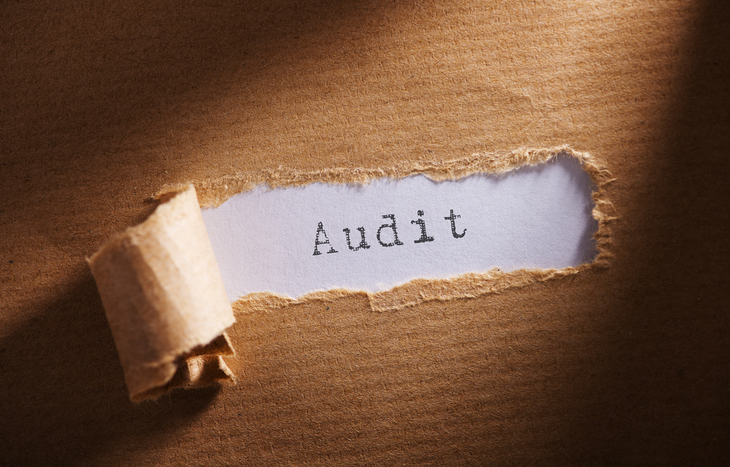What is an External Audit?

The Securities and Exchange Commission (SEC) requires public companies to issue financial statements. Before these statements become available to investors and the public, they need to undergo an external audit. This is an audit performed by an independent (external) accountant.
An external audit serves as an objective evaluation of a company’s financial records. Auditors make sure that the information presented is accurate, verifiable and transparent—and that it supports any financial claims made. It’s an important and imperative process for maintaining reputability as a public company.
External audits typically follow internal audits as part of a multifaceted approach to financial statement verification.

Generally Accepted Accounting Principles (GAAP)
The SEC requires public companies to report financials according to Generally Accepted Accounting Principles (GAAP). This standard ensures two things: 1) that every company uses the same benchmarks when reporting financial information, and 2) that those standards are universally understood by auditors. GAAP sets the standard for accounting across companies big and small, to improve reporting accuracy and safeguard against any “creative” accounting practices that could mislead investors.
Generally Accepted Auditing Standards (GAAS)
Like GAAP, Generally Accepted Auditing Standards (GAAS) are a set of standards that ensure all external audits follow the same criteria. Again, this creates a twofold benefit: 1) every company is subject to benchmarked auditing standards, and 2) auditors can accurately evaluate companies to these standards. GAAS also ensures that any time auditing practices change, CPAs will all adopt them the same way.
What Gets Audited and How Often?
External audits probe the complete scope of a company’s financial documentation. This includes essential documents like cash flow statement, income statement and balance sheet, as well as any other pertinent documentation needed to verify information. Audits can also extend to bank statements, the general ledger and documentation regarding loans and liabilities.
Public companies need to undergo an external audit at least once per year to produce a 10-K filing: an annual business disclosure report. However, many larger companies continuously audit year-round, as a way of staying on top of accounting and to ensure transparency in all financial reports, including 8-K and 10-Q reports.
Who Performs External Audits?
Since the passage of the Sarbanes–Oxley Act of 2002, transparency in accounting has been a significant focus for public companies. The act, passed in response to massive accounting scandals like Enron and WorldCom, mandates various levels of auditing and audit compliance from public firms. This includes both internal and external auditing.
While almost every public company has an in-house auditing team, they often keep Certified Public Accountants (CPAs) on retainer. CPA firms have the ongoing task of vetting the company’s financial statements after the internal team has reviewed them, to remain compliant with SEC reporting standards. The process of an external audit is relatively straightforward.
- Appointment of the auditor or firm
- Collection, assessment and interpretation of financial data
- Identification of accounting irregularities (if any)
- Confirmation of compliance with accounting standards
- Writing the audit report and issuing an opinion
While an external audit is essentially the same for every public company, the scope of that audit can vary significantly depending on the size of the business and the complexity of its finances. For example, a micro-cap company with simple operations may only need a couple of CPAs to complete the audit, while multinational mega-cap companies often require multiple CPA firms working tirelessly to complete audits on-time.
Auditor Opinions and Their Meanings
As part of the conclusion of an external audit, the auditing CPA will render an opinion. This opinion provides a final verdict pertaining to the accuracy and validity of the records. There are four possible opinions:
- Unqualified. The auditor hasn’t found anything suspect or misstated within financials.
- Qualified. Something isn’t GAAP-compliant, but doesn’t appear misrepresented.
- Adverse. Gross misrepresentation of financials; likely a precursor to fraudulent activity.
- Disclaimer. This doesn’t indicate wrongdoing—rather, an incomplete audit.
Most external audits end in an unqualified opinion, signaling compliance with GAAP and accuracy of statements. Some companies reporting non-GAAP metrics may receive unqualified opinions, but investors have no reason to suspect wrongdoing. Very rarely will external audits yield adverse opinions—those that do are typically already under investigation by the SEC or IRS.
Beyond Financial Statements
External audits don’t only pertain to a company’s financial documents. They can also include audits of the company’s internal controls. This is particularly important for cash-heavy businesses and those carrying significant inventory. External auditors may review the company’s internal processes and controls for handling money or inventory, to ensure its recorded and reported accurately.
Transparency and Unbiased Verification
Investors deserve a transparent look at the financials of any company they’re interested in investing in. This is why the SEC mandates regular financial filings and an annual external audit. The opinion of an unbiased auditor is invaluable—it’s the final word on the validity of the company’s financial claims. Investors can review financial statements and make decisions with the full confidence that the data they’re looking at is real, accurate and verified.
To advance your investment knowledge and financial literacy even further, sign up for the Investment U e-letter below. you can learn more about audits, various financial terms and investment strategies by entering your email address below!
For investors old enough to remember Enron and WorldCom, and the accounting scandals that toppled these gigantic companies, the stamp of approval from an external auditor comes with high regard. Consider this the next time you’re perusing the 10-K or 10-Q of a company and are curious about its financials.






